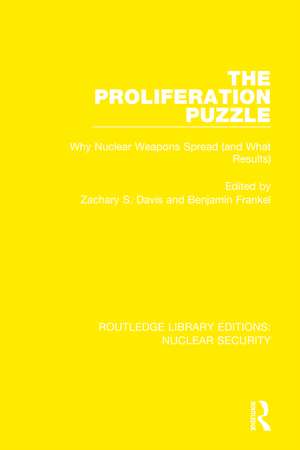The Proliferation Puzzle: Why Nuclear Weapons Spread (and What Results): Routledge Library Editions: Nuclear Security
Editat de Zachary S. Davis, Benjamin Frankelen Limba Engleză Hardback – 2 dec 2020
The proliferation of nuclear weapons is an ideal subject for social science scholarship, and such scholarship is especially timely now. Among the topics discussed in The Proliferation Puzzle are:
- The building of nuclear weapons is a complex task touching upon many of the subjects of study at the core of social science and international relations. Nuclear weapons may be acquired as a hedge against external threat, for reasons of national prestige, or as a result of pressures by domestic coalitions among scientists, bureaucrats, and the military. They may be sought for defensive purposes or to support hegemonic aspirations. Nuclear weapons also raise questions about civilian command and control, especially in crisis situations.
- During the last two decades the acquisition of nuclear weapons has been proscribed by the non-proliferation regime. The decisions countries made about acquiring these weapons and the manner they chose to build them serve as a test of the efficacy of this particular regime, and of international regimes more generally.
- Nuclear weapons were introduced at the time bipolarity became the international order. As the world moves away from bipolarity, there is a need to answer questions such as: What would be the effect of nuclear weapons in a multipolar order? How will the spread of nuclear weapons affect the distribution of capabilities among states? If nuclear weapons spread to additional countries, will they enhance stability or exacerbate instability? Can the spread of these weapons be managed or controlled?
| Toate formatele și edițiile | Preț | Express |
|---|---|---|
| Paperback (1) | 359.23 lei 6-8 săpt. | |
| Taylor & Francis – 4 sep 2022 | 359.23 lei 6-8 săpt. | |
| Hardback (1) | 904.61 lei 6-8 săpt. | |
| Taylor & Francis – 2 dec 2020 | 904.61 lei 6-8 săpt. |
Din seria Routledge Library Editions: Nuclear Security
-
 Preț: 258.67 lei
Preț: 258.67 lei -
 Preț: 313.34 lei
Preț: 313.34 lei -
 Preț: 323.58 lei
Preț: 323.58 lei -
 Preț: 322.97 lei
Preț: 322.97 lei -
 Preț: 256.34 lei
Preț: 256.34 lei -
 Preț: 349.05 lei
Preț: 349.05 lei -
 Preț: 322.97 lei
Preț: 322.97 lei - 18%
 Preț: 782.44 lei
Preț: 782.44 lei -
 Preț: 316.06 lei
Preț: 316.06 lei - 18%
 Preț: 891.36 lei
Preț: 891.36 lei -
 Preț: 274.88 lei
Preț: 274.88 lei -
 Preț: 243.85 lei
Preț: 243.85 lei -
 Preț: 313.34 lei
Preț: 313.34 lei - 18%
 Preț: 787.17 lei
Preț: 787.17 lei -
 Preț: 323.58 lei
Preț: 323.58 lei - 15%
 Preț: 695.90 lei
Preț: 695.90 lei -
 Preț: 278.03 lei
Preț: 278.03 lei - 18%
 Preț: 891.36 lei
Preț: 891.36 lei -
 Preț: 310.66 lei
Preț: 310.66 lei - 18%
 Preț: 782.44 lei
Preț: 782.44 lei -
 Preț: 313.34 lei
Preț: 313.34 lei -
 Preț: 349.80 lei
Preț: 349.80 lei - 15%
 Preț: 697.53 lei
Preț: 697.53 lei -
 Preț: 315.68 lei
Preț: 315.68 lei -
 Preț: 242.54 lei
Preț: 242.54 lei - 18%
 Preț: 790.66 lei
Preț: 790.66 lei - 18%
 Preț: 790.82 lei
Preț: 790.82 lei - 15%
 Preț: 700.30 lei
Preț: 700.30 lei - 15%
 Preț: 699.46 lei
Preț: 699.46 lei - 37%
 Preț: 11400.92 lei
Preț: 11400.92 lei - 18%
 Preț: 895.94 lei
Preț: 895.94 lei
Preț: 904.61 lei
Preț vechi: 1103.18 lei
-18% Nou
Puncte Express: 1357
Preț estimativ în valută:
173.15€ • 188.14$ • 145.54£
173.15€ • 188.14$ • 145.54£
Carte tipărită la comandă
Livrare economică 21 aprilie-05 mai
Preluare comenzi: 021 569.72.76
Specificații
ISBN-13: 9780367543532
ISBN-10: 0367543532
Pagini: 366
Dimensiuni: 156 x 234 x 21 mm
Greutate: 0.83 kg
Ediția:1
Editura: Taylor & Francis
Colecția Routledge
Seria Routledge Library Editions: Nuclear Security
Locul publicării:Oxford, United Kingdom
ISBN-10: 0367543532
Pagini: 366
Dimensiuni: 156 x 234 x 21 mm
Greutate: 0.83 kg
Ediția:1
Editura: Taylor & Francis
Colecția Routledge
Seria Routledge Library Editions: Nuclear Security
Locul publicării:Oxford, United Kingdom
Public țintă
Postgraduate, Professional, and UndergraduateCuprins
Nuclear Weapons Proliferation: Theory and Policy Benjamin Frankel and Zachary S. Davis. Part 1: Realist Approaches Dividing Realism: Structural Realism versus Security Materialism on Nuclear Security and Proliferation Daniel Deudney. The Brooding Shadow: Systemic Incentives and Nuclear Weapons Proliferation Benjamin Frankel. The Realist Nuclear Regime Zachary S. Davis. Paranoids, Pygmies, Pariahs and Nonproliferation Revisited Richard K. Betts. Part 2: State-Oriented Approaches The End of the Cold War and the Future of Nuclear Proliferation: An Alternative to the Neo-Realist Perspective Glenn Chafetz. Proliferation Optimism and Theories of Nuclear Operations Peter D. Feaver. Nuclear Myths and the Causes of Nuclear Proliferation Peter R. Lavoy. Understanding Nuclear Proliferation: Theoretical Explanation and China’s National Experience Avery Goldstein. The Power of Suggestion: Opaque Proliferation, Existential Deterrence, and the South Asian Nuclear Arms Competition Devin T. Haggerty. Part 3: Four More Models The Economic and Political Incentives to Acquire Nuclear Weapons Dagobert L. Brito and Michael D. Intriligator. Forecasting the Risks of Nuclear Proliferation: Taiwan as an Illustration of the Method Bruce Bueno de Mesquita, James D. Morrow and Samuel S. G. Wu. Multilateral Cooperation and Nuclear Nonproliferation Richard T. Cupitt and William J. Long. Appendix: Technical Barriers to Nuclear Proliferation Peter D. Zimmerman. The Contributors.
Descriere
First published in 1993, this volume was unique in its scope and approach: Unlike most literature on nuclear weapons proliferation at the time, the essays in this volume offer theoretical discussions and suggest testable hypotheses about the causes and effects of nuclear weapons proliferation.
